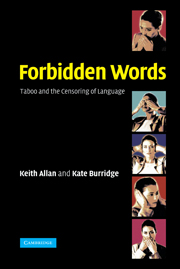Book contents
- Frontmatter
- Contents
- List of figures
- Acknowledgements
- 1 Taboos and their origins
- 2 Sweet talking and offensive language
- 3 Bad language? Jargon, slang, swearing and insult
- 4 The language of political correctness
- 5 Linguistic purism and verbal hygiene
- 6 Taboo, naming and addressing
- 7 Sex and bodily effluvia
- 8 Food and smell
- 9 Disease, death and killing
- 10 Taboo, censoring and the human brain
- Notes
- References
- Index
9 - Disease, death and killing
Published online by Cambridge University Press: 03 December 2009
- Frontmatter
- Contents
- List of figures
- Acknowledgements
- 1 Taboos and their origins
- 2 Sweet talking and offensive language
- 3 Bad language? Jargon, slang, swearing and insult
- 4 The language of political correctness
- 5 Linguistic purism and verbal hygiene
- 6 Taboo, naming and addressing
- 7 Sex and bodily effluvia
- 8 Food and smell
- 9 Disease, death and killing
- 10 Taboo, censoring and the human brain
- Notes
- References
- Index
Summary
In this chapter, we examine some of the less happy aspects of human existence: disease, death and killing. We shall focus on the modern western experience of human affliction and the language that speakers use when they have to confront the unnerving reality that, despite miracle cures and ageless bodies, we will not live for ever. This is not a medical textbook; our discussion is about the way people use language when expressing the emotional and social aspects of disease and death.
Unease in talking about disease
Misfortune is taboo. Even though few in our technically advanced and largely secular twenty-first century would admit to the sort of fear and superstition that we associate with the taboos of exotic and unenlightened peoples, there are many who still carry talismans when they travel, avoid walking beneath ladders, and believe in lucky and unlucky numbers. We try to avoid tempting fate by not speaking of misfortune. On the other hand, we try to protect good fortune by doing things like crossing fingers and touching wood. Humans seem to be naturally pessimistic creatures and, with time, words to do with chance typically deteriorate – ‘good fortune’ becomes ‘bad fortune’. The English word accident originally had the much wider meaning of Latin accidens ‘happening’ (preserved in the expression by accident), but it has now narrowed to ‘misfortune’. Diseases are really ‘accidents’ of the body.
- Type
- Chapter
- Information
- Forbidden WordsTaboo and the Censoring of Language, pp. 203 - 236Publisher: Cambridge University PressPrint publication year: 2006



